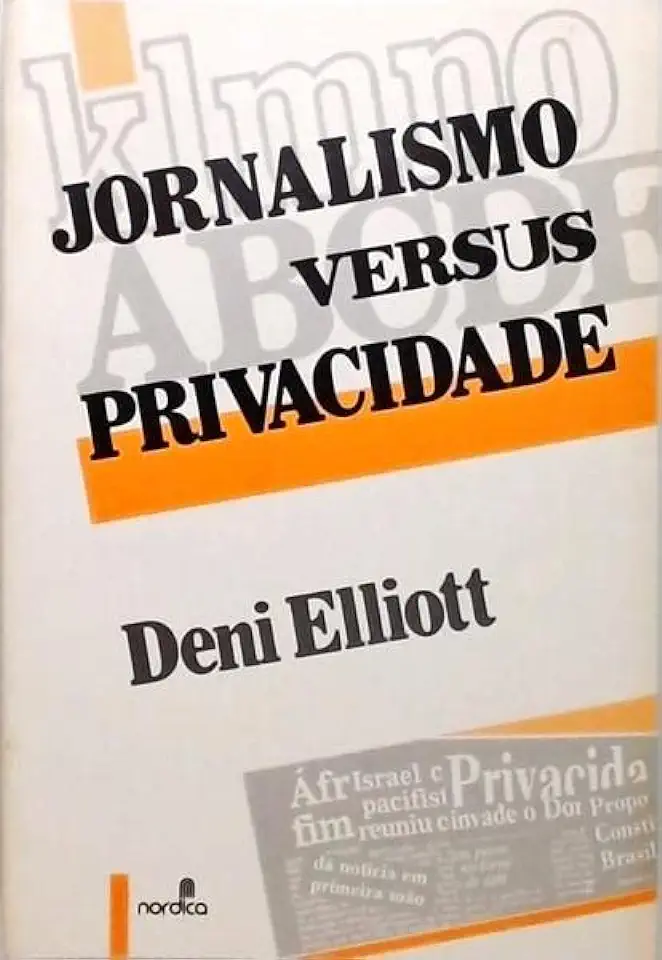
Journalism Versus Privacy - Deni Elliott
Journalism Versus Privacy: A Book Review
Introduction
In her book, "Journalism Versus Privacy," Deni Elliott explores the complex and often contentious relationship between journalism and privacy. She argues that both are essential to a free and democratic society, but that they can also come into conflict with each other. Elliott examines a number of high-profile cases in which journalists have been accused of violating people's privacy, and she considers the ethical and legal issues that arise in these cases. She also discusses the impact of new technologies on privacy, and she argues that journalists need to be more mindful of the privacy rights of their sources and subjects.
The Importance of Journalism
Journalism is essential to a free and democratic society. It informs the public about important issues, holds those in power accountable, and provides a platform for people to express their views. Without journalism, the public would be less informed, less engaged in the political process, and less able to hold those in power accountable.
The Importance of Privacy
Privacy is also essential to a free and democratic society. It allows people to control their own information, to make choices about who they share it with, and to be free from unwanted intrusion. Privacy is important for personal autonomy, for freedom of thought and expression, and for the development of close relationships.
The Conflict Between Journalism and Privacy
Journalism and privacy can come into conflict with each other when journalists publish information about people that they would rather keep private. This can happen in a number of ways, such as when journalists:
- Publish information about people's personal lives without their consent.
- Use hidden cameras or microphones to record people without their knowledge.
- Publish information that is false or misleading.
- Reveal the identities of confidential sources.
High-Profile Cases of Privacy Violations
There have been a number of high-profile cases in which journalists have been accused of violating people's privacy. Some of these cases include:
- The publication of nude photos of celebrities without their consent.
- The use of hidden cameras to record people in their homes or other private settings.
- The publication of information about people's medical conditions without their consent.
- The revelation of the identities of confidential sources.
These cases have raised important questions about the ethical and legal limits of journalism.
The Impact of New Technologies on Privacy
New technologies have made it easier for journalists to collect and publish information about people. This has made it more difficult for people to control their own information and to be free from unwanted intrusion. Some of the new technologies that have had the greatest impact on privacy include:
- The internet
- Social media
- Mobile phones
- GPS tracking devices
These technologies have made it possible for journalists to collect and publish information about people that would have been impossible just a few years ago.
The Need for Journalists to Be More Mindful of Privacy Rights
Journalists need to be more mindful of the privacy rights of their sources and subjects. This means taking steps to protect their identities, to obtain their consent before publishing information about them, and to be accurate and fair in their reporting. Journalists also need to be aware of the impact of new technologies on privacy and to take steps to minimize the risks to privacy.
Conclusion
Journalism and privacy are both essential to a free and democratic society. However, they can also come into conflict with each other. Journalists need to be mindful of the privacy rights of their sources and subjects, and they need to take steps to protect their privacy. By doing so, journalists can help to ensure that both journalism and privacy can thrive.
Call to Action
If you are interested in learning more about the complex relationship between journalism and privacy, I encourage you to read Deni Elliott's book, "Journalism Versus Privacy." This book is a valuable resource for anyone who is interested in journalism, privacy, or the law.
Enjoyed the summary? Discover all the details and take your reading to the next level — [click here to view the book on Amazon!]